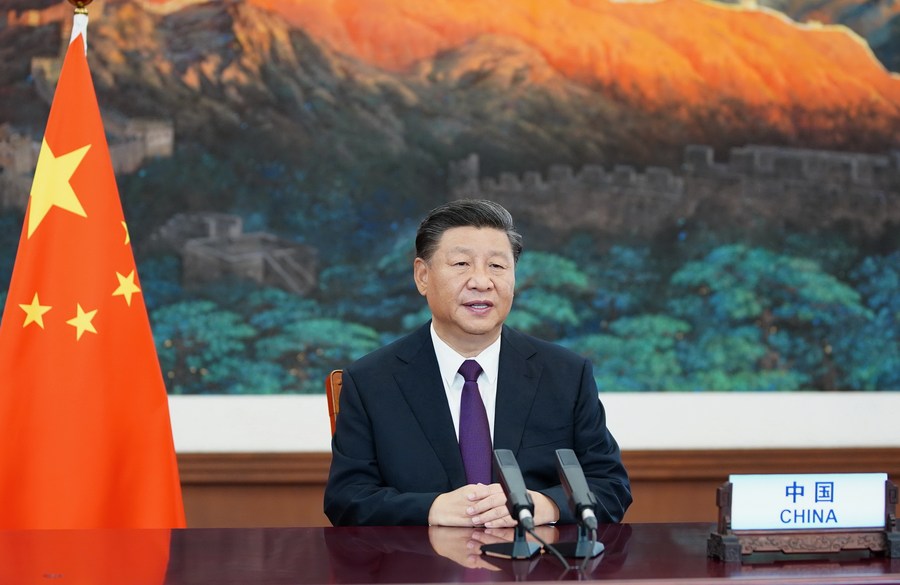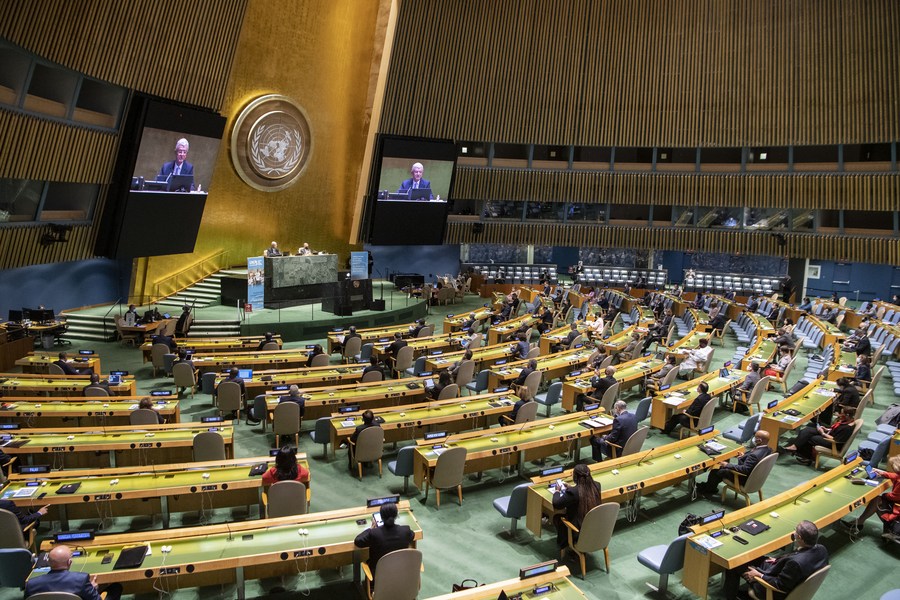Overseas experts commend Xi's proposals for upholding multilateralism, building shared future

Chinese President Xi Jinping addresses a high-level meeting to commemorate the 75th anniversary of the United Nations via video on Sept. 21, 2020. [Xinhua/Ju Peng]
Xi's speech was commended by overseas experts who highlighted strong collective efforts of the international community to tackle global threats and challenges.
BEIJING -- The United Nations (UN) must stand firm for justice, uphold the rule of law, promote cooperation and focus on real action in the post-COVID era, Chinese President Xi Jinping said Monday.
While addressing a UN high-level meeting that commemorates the organization's 75th anniversary via video, Xi reaffirmed China's commitments to multilateralism and the reform and development of global governance system, pledging to promote a community with a shared future for mankind.
Xi's speech was commended by overseas experts who highlighted strong collective efforts of the international community to tackle global threats and challenges.
Antonio Vitorino, director general of the International Organization for Migration, said Xi's reiteration of China's commitments to the multilateral system in the international arena is "the clear support for the central role of the UN system in coming together and supporting member states" in this time of the pandemic.
Sergey Lukonin, head of the Sector of Economy and Politics of China at the Institute of World Economy and International Relations of the Russian Academy of Sciences, said that China is committed to a just world order and seeking a more equitable distribution of opportunities.
China has actively advocated the concept of multilateralism, an action that has won widespread support, said Lukonin.
B.R. Deepak, chairperson at the Center of Chinese and Southeast Asian Studies at the New Delhi-based Jawaharlal Nehru University, said that given the uncertainty caused by COVID-19 and global economic downturn, "there is a dire need to put our heads together and find global solutions for raging issues, and this could be found only by strengthening multilateralism."

Volkan Bozkir (rear L), president of the 75th session of the United Nations General Assembly (UNGA), addresses a high-level meeting to commemorate the 75th anniversary of the UN at the UN headquarters in New York, on Sept. 21, 2020. [Eskinder Debebe/UN Photo/Handout via Xinhua]
Only by strengthening multilateralism, a just, transparent, and accountable global order can be established, said Deepak, adding that China's notion of building a community with a shared future for mankind, as well as the establishment of the Asian Infrastructure Investment Bank and the New Development Bank, could be an answer to tackling global challenges.
Cavince Adhere, an international relations researcher based in Nairobi, said that China has exhibited its desire and commitment to strengthening multilateralism and global cooperation as an active actor in international affairs.
Like the COVID-19 health crisis has revealed, the future and fate of humanity is intractably joined, said the scholar, adding that the world must enhance solidarity and cooperation with multilateral aspirations to provide sustainable solutions to the prevailing challenges.
Charles Onunaiju, director of the Center for China Studies in Nigeria, said "China's engagement with the multilateral system is a foremost network connection to engage with each other to promote international relations" through missions such as UN peacekeeping.
"China has brought in a practical roadmap to engage and give practical expression to the community of a shared future by using the Belt and Road Initiative as a real platform" to push for an international framework of global governance that is open, transparent and inclusive, he said.
























